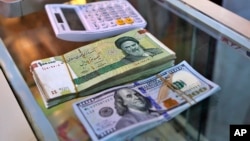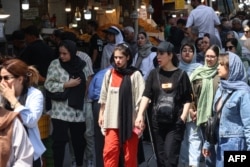Welcome back to The Farda Briefing, an RFE/RL newsletter that tracks the key issues in Iran and explains why they matter.
I'm RFE/RL correspondent Kian Sharifi. In this edition, I'm looking into growing concerns in Iran over the fallout from the reinstatement of UN sanctions even as officials seek to downplay their impact.
What You Need To Know
• Europe Pulls Trigger On UN Sanctions: Britain, France, and Germany initiated the process of restoring UN sanctions against Iran on August 28, with diplomats signaling the move is meant to pressure Tehran into new nuclear commitments within 30 days. While Iranian officials have sought to downplay the impact of sanctions, others are warning of severe repercussions for the economy.
• Psychiatrists Decry Rise In Public Executions: The Iranian Psychiatric Association has written to the head of the judiciary urging an immediate halt to public executions in Iran. The letter, signed by the association's president, Vahid Shariat, argued that public executions have no proven impact on reducing crime. Instead, it warns, such practices can cause severe psychological and social harm in society, including increased violence and serious mental health consequences, particularly for children.
• Australia Plans To Blacklist IRGC: Australia this week announced the expulsion of Iran's ambassador and signaled plans to formally designate the Islamic Revolutionary Guards Corps (IRGC) as a terrorist organization, a move that could encourage the United Kingdom and European Union to follow suit. According to Australian intelligence, Tehran was linked to anti-Semitic arson attacks targeting Jewish community sites in Sydney and Melbourne in late 2024. The ambassador, along with three other Iranian officials, has been ordered to leave within a week -- marking the first time since World War II that Australia has expelled a foreign ambassador. Iran's Ambassador Ahmad Sadeqi left Australia on August 28, according to local media.
The Big Issue
Best Case? Bad. Worst Case? Even Worse.
In a new briefing released on August 28, the Iran Chamber of Commerce predicted that in the best-case scenario the US dollar could jump to 1,150,000 rials. Worst case? You're looking at 1,650,000 rials if pressure intensifies.
Either would mark a record low, with the rial already bottoming out at 1,043,000 to the dollar in April.
Current annual inflation, at 50 percent, could balloon to as much as 90 percent, while economic growth may slide to -3 percent in the worst-case scenario. Optimistic forecasts put growth at just 1.5 percent.
Chamber analysts cite shrinking foreign currency reserves, restrictions on oil sales, inflationary expectations, and rising geopolitical risk as drivers for the predicted turmoil. They warn that tougher sanctions could worsen supply chain disruptions, stall industrial projects, and push unemployment higher.
The message to policymakers: Prepare now for every possible scenario to protect Iran's economic future -- but that's easier said than done.
Why It Matters: The "snapback" provision in Iran's 2015 nuclear deal was designed to bypass a UN veto and automatically trigger sanctions after 30 days.
If implemented, it would freeze Iranian assets abroad, block arms deals with Tehran, and sanction ballistic missile development, among other penalties.
Iran has threatened to take action should the sanctions be reinstated, including withdrawing from the nuclear Non-Proliferation Treaty (NPT).
What's Being Said: Tehran has tried to downplay the fallout. Government spokeswoman Fatemeh Mohajerani argued the sanctions' impact is "more psychological than economic," while Foreign Minister Abbas Araqchi said that as "bad" as they are, their weight has been exaggerated.
Markets aren't buying it. Even before Europe formally triggered the snapback on August 28, the rial had already started sliding against the dollar.
Expert Opinion: Economy expert Roshanak Astaraki told RFE/RL's Radio Farda that the rial will drop value against the dollar, but the extent of it depends on what policies the Central Bank of Iran chooses to adopt.
Top of the list is lowering government expenses, she said, warning that a failure to do so could make matters so bad there could even be mass protests.
Astaraki suggested the least essential entities -- such as ideological and propaganda organizations that "play no role in the economy" -- should have their budgets slashed, "at least on a temporary basis."
That's all from me for now.
Until next time,
Kian Sharifi
If you enjoyed this briefing and don't want to miss the next edition, subscribe here. It will be sent to your inbox every Friday.







